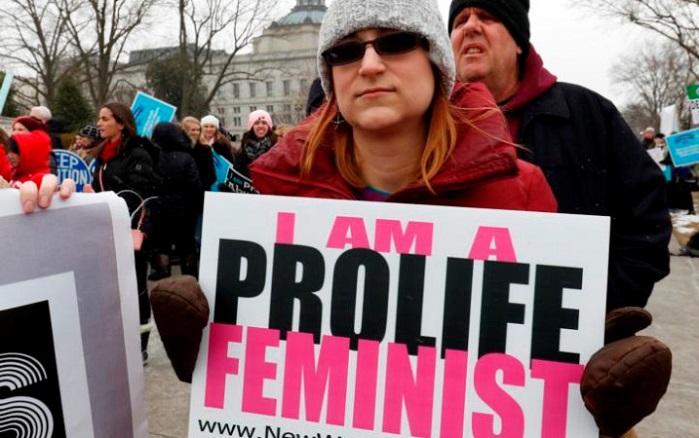By Jonathon Van Maren
For the last couple of weeks, there’s been quite a bit of debate going on about who can legitimately call themselves a “feminist,” especially after a pro-life group that identifies as feminist got disinvited from being a public sponsor of the Women’s March on Washington. The organizers of the Women’s March, which was essentially a rally for Planned Parenthood (Cecile Richards got the biggest cheer of all the speakers), pointed out that abortion is a central tenet of feminism in its current manifestation, and based on the screams of support abortion activists got at the Women’s March, they are right.
Some pro-life groups and conservative media outlets had a bit of fun with this, pointing out that modern feminism was obviously an exclusionary ideology, since the current gatekeepers seem determined to deny the label to women who oppose abortion on demand. Others pointed out that the original suffragettes, from Susan B. Anthony to Alice Paul, were opposed to abortion.
I find the entire argument to be confusing insofar as it is a colossal waste of time, for a few reasons. First, I was at the Women’s March. It was a giant abortion rally. There may have been some very good feminists back in the day, but that was then and this is now. Modern feminism has cemented itself into today’s politics with the blood of more than fifty million pre-born babies, who paid with their lives for the so-called “liberty” of Gloria Steinem, Cecile Richards, and the rest of the carnivorous ideologues who are the face of today’s movement. If nothing else, the term “feminist” has been so tainted by its association with the killing of human beings that it should be of no appeal or use to us.
Secondly, nobody cares about “feminism” anymore. That’s the reason the Women’s March had to join forces with Black Lives Matter, climate change activists, LGBTQ protesters, environmentalists, and an entire hodge-podge of progressive activists. The reality is that according to every poll we have, people aren’t much interested in the “feminist” label—in Canada, only 32% of women call themselves a feminist. According to a 2013 Huffington Post/YouGov Poll, only 23% of American women consider themselves to be a “feminist.” So the real question is simpler: Why are we fighting over a label that nobody cares about anymore? We might think it’s clever to call ourselves “pro-life feminists” in order to watch the abortion activists have conniptions, and granted, that’s always fun. But the idea that “pro-life feminism” is going to gain any traction is a bit ludicrous—after all, the term feminism can’t even get traction anymore.
The term feminism is, at this point, mostly useful for politicians and media figures who enjoy utilizing it for virtue-signalling. Outside a certain bubble, most people are carrying on with their lives and earning a living and raising families and not concerning themselves with the term “feminist” or who owns it, which is why less than a quarter of them bother to use it. It’s a historical term more than anything else: Back in the day, there was a movement that fought for women’s rights. Then, there was a second movement led predominantly by a racist eugenicist who founded Planned Parenthood. Since then, Planned Parenthood has more or less been the flagship of feminism. That’s not going to change. Fortunately for us, it doesn’t matter anymore. The pro-life movement is in the business of saving babies, not duking it out over a term that over three quarters of the population find irrelevant.









You said: “But the idea that “pro-life feminism” is going to gain any traction is a bit ludicrous—after all, the term feminism can’t even get traction anymore.”
But you also said: “If nothing else, the term ‘feminist’ has been so tainted by its association with the killing of human beings that it should be of no appeal or use to us.”
The latter statement suggests that removing the taint would help to restore the appeal and usefulness of the term. Pro-life feminism is feminism without that taint.
Right. So the term is not only tainted, it is also a term nobody wants to use anymore. So far from suggesting that it could be useful, it highlights that 1. This term is not useful for us due to its association with murder (much like segregation’s association with lynching and injustice), and 2. Since nobody wants to use the term anyways, it’s a waste of time to try and reclaim a term that nobody wants to claim to begin with.